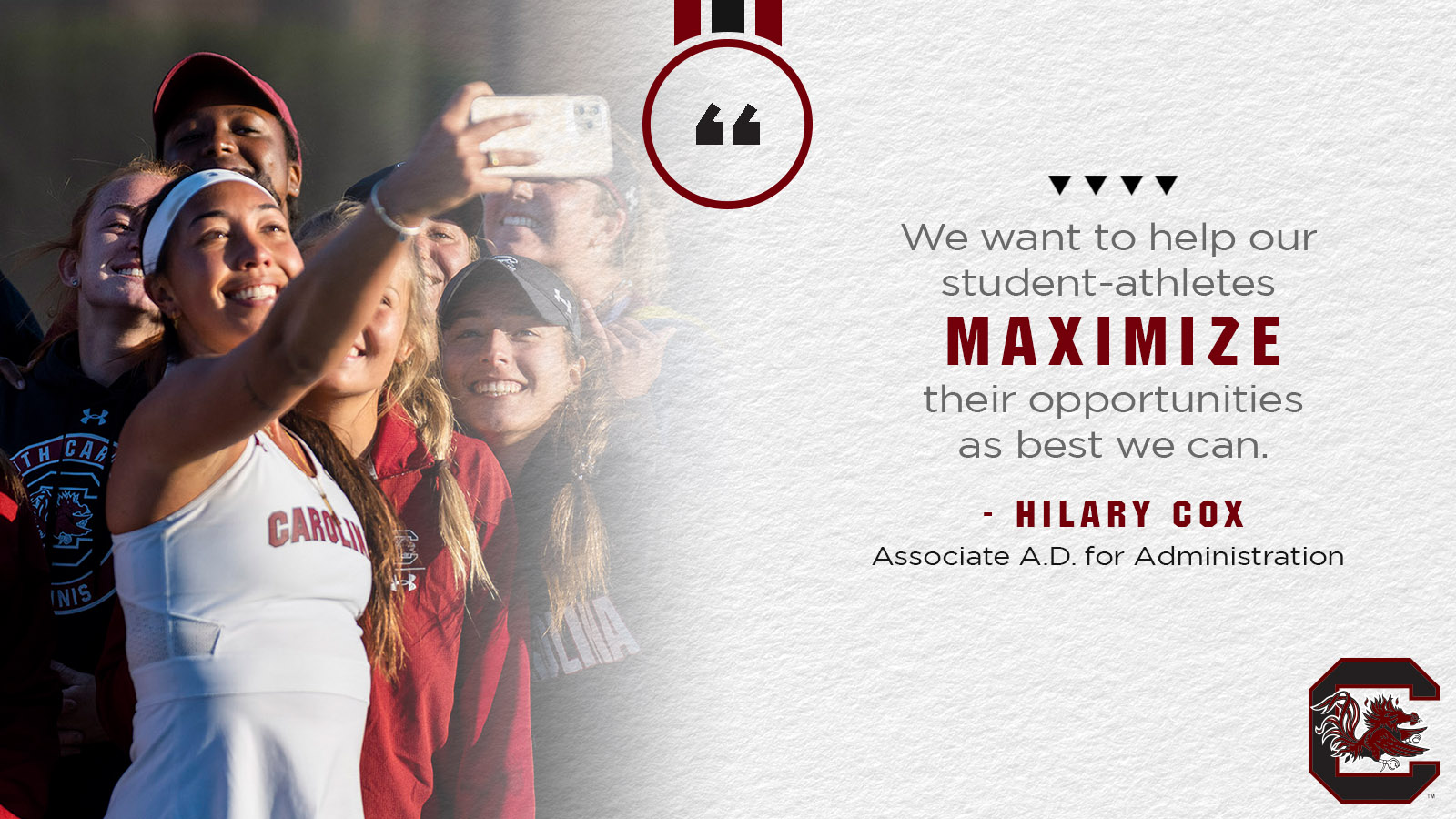
Name, Image, Likeness Education is an On-Going Process
With restrictions removed on a student-athlete’s ability to capitalize on their name, image, and likeness (NIL), they can now be compensated through third-party endorsements. While this presents new opportunities for NCAA student-athletes, South Carolina Athletics has been active in educating the Gamecocks, staff, and businesses about how it all works.
“We are being as flexible as we can,” said Hilary Cox, Associate A.D. for Administration and the point person for the NIL program. “We want to help our student-athletes maximize their opportunities as best we can. Our goal with this is outreach and education.
“This has been a very long process, and we’re being very intentional and thoughtful on this. This has been going on for about a year now where we’ve had preliminary conversations. We’ve had Altius Sports Partners (a name, image and likeness advisory and education firm) since early this year to have those conversations and bring in various departments in athletics to talk about it because it touches all of them in some way.
“Through this process, we have met with several departments within Athletics to discuss the changes that will occur. We have positioned ourselves uniquely to be at the forefront of Name, Image, Likeness and I believe in our long-term vision. I’ve seen first-hand everyone’s commitment to helping our student-athletes maximize their opportunities.”
For background, the Division 1 Board of Directors approved a policy which allows all NCAA student-athletes to be compensated for their name. image, and likeness as of July 1 regardless of whether their state has a NIL law in place or not. However, the NCAA NIL rules don’t override state, college/university or conference specific NIL rules. This means that the Gamecocks needed to be educated on the NIL rules for the state and the athletics department to understand what limitations they may have.
“Athletics Director Ray Tanner was at the state capitol several times, and we were very involved in helping create the state law,” Cox said. “We attended all those meetings and provided as much feedback as we could. Once the state law was passed at the end of May, we turned our focus to what we would do institutionally.”
“We’re trying not to be restrictive in areas we don’t have to be.”
The NCAA had some restrictions that were different than the state, so once the state declared its policy was going into effect on July 1, the Athletics Department rolled out its policy which is based on state law.
“Our policy does have some restrictions, but they’re only there because of state law,” Cox said. “For instance, state law says that you can’t use your institutional facility (in NIL endorsements), so our policy says you can’t use institutional facilities. There is nothing that we are restricting that isn’t already restricted by the state.
“One thing that is unique is that we do allow the use of our institutional marks, provided that the student-athletes go through the correct process.”
That includes assuring that businesses have gone through proper channels to use those institutional marks for each specific activity or endorsement.
“The state law prohibits vice categories, which includes gambling, tobacco, alcohol, adult entertainment, and illegal or illicit activities,” Cox said. “We’re trying not to be restrictive in areas we don’t have to be.”
The Athletics Department cannot be involved in setting up any of the endorsement deals and has also been busy in educating businesses with what they can and can’t do. State law allows student-athletes to sign with agents specifically for marketing purposes, but that agent cannot represent them for professional sports opportunities.
Educating the student-athletes and businesses is an on-going process. The student-athletes were given the chance to attend a webinar (in late July) and individual team educational sessions have also been provided by the Athletics Department over the summer.
Since this is all new, there will be challenges in year one of NIL.
“The biggest challenge we face is the breadth of where this reaches,” Cox said. “Name, image, likeness is something that is a fundamental shift in the world of college athletics. We need to prepare student-athletes as best we can while also educating our coaches, staff members, businesses, media, agents, and boosters. My goal is to ensure that we can educate as many constituents as possible. I believe in the plan that we have in place, and I am excited to get our student-athletes back on-campus this month so we can continue our momentum.”












